Mastering the basics of organic gardening is not only a gratifying experience but also beneficial for both health and the environment. Organic gardening involves avoiding synthetic fertilizers and pesticides that are harmful to the environment and instead focuses on nurturing healthy soil to create gardens with fewer pest and disease problems.
To get started with organic gardening, it’s important to understand your local climate by knowing your region’s USDA plant hardiness zone and frost-free date. This information will help you select appropriate plants and determine the right time to plant them. Additionally, selecting the right garden site is crucial, considering factors such as size, sun exposure, soil quality, water availability, and wind conditions.
Key Takeaways:
- Organic gardening involves avoiding synthetic fertilizers and pesticides.
- Understanding your local climate is important in organic gardening.
- Selecting the right garden site is crucial for a successful organic garden.
Understanding Your Local Climate
To get started, it is important to understand your local climate by determining your USDA plant hardiness zone and researching your local frost-free date. This information will help you select appropriate plants and plan your garden accordingly. It is also helpful to consult with experienced local gardeners, who can provide valuable insights into which plants thrive in your area.
| Factors to Consider When Selecting a Garden Site |
|---|
| Size |
| Sun exposure |
| Soil quality |
| Water availability |
| Wind conditions |
When selecting a garden site, consider the size of the area you have available, as well as its exposure to the sun. You will also want to check the soil quality and ensure that there is sufficient water available. Wind conditions can also play a role in the success of your garden, so it is important to take them into account.
It is also important to check the soil type and ensure that there is sufficient soil depth for successful gardening. Building healthy soil is crucial for organic gardening, and over time, organic gardening techniques can help improve soil health.
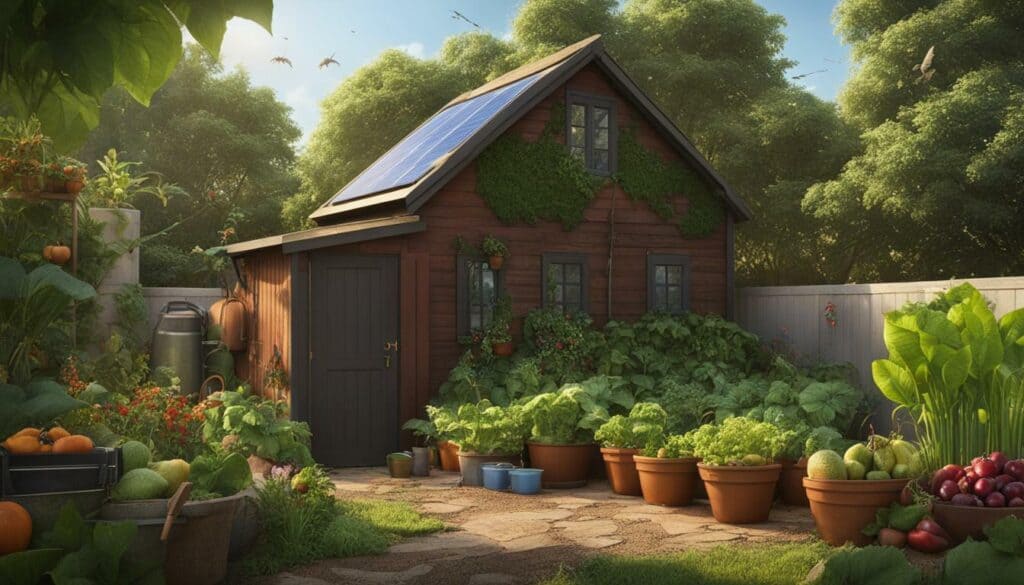
Illustration: Organic gardening practices can promote sustainable gardening and benefit the environment.
Seeking Insights from Experienced Gardeners
Experienced local gardeners can provide valuable insights and tips for beginners venturing into organic gardening. When starting an organic garden, it’s important to get to know your local climate and research your area’s frost-free date. This information can help you determine which plants will thrive in your garden.
Additionally, selecting the right garden site is crucial to your garden’s success. Your garden should be visible from your home, have access to at least six hours of full sun, and have good soil quality and drainage.
Understanding your soil is also important, as it can affect the success of your garden. Adding compost, topsoil, and peat moss can help improve soil quality. Seeking insights from experienced gardeners can provide valuable information and guidance to help you grow a healthy and thriving garden.
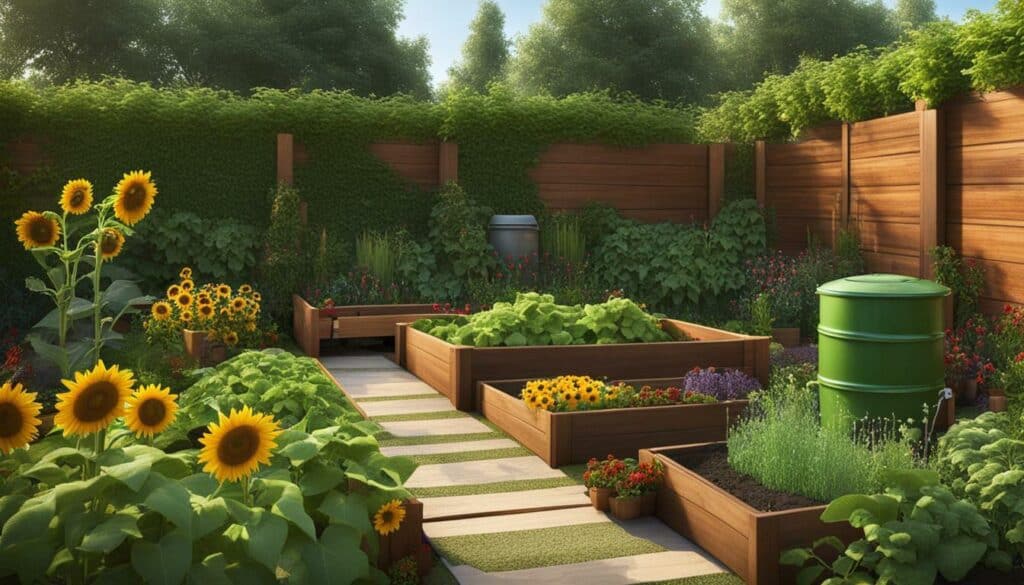
Don’t hesitate to ask local gardeners for advice and tips on starting an organic garden. They can provide first-hand knowledge on which plants will grow well in your area and what practices have worked well for them. By seeking insights from experienced gardeners, you can gain the confidence and knowledge needed to start your own organic garden.
Selecting a Suitable Garden Site
Selecting a suitable garden site is a crucial step when starting an organic garden. There are several factors to consider when choosing a location for your garden. One important aspect is the size of the garden site. If your property is small, it’s important to select a spot that is easily accessible from your house. If you have a larger property, consider a location that is visible from your home or in an area that you pass by daily. This way, you can easily monitor and tend to your garden.
Another key consideration is the amount of sunlight the garden site receives. Most plants need at least six hours of full sun every day, so it’s important to choose a spot that gets adequate sunlight. Additionally, it’s a good idea to check the soil in your intended garden site. If possible, select a location with deep, well-draining soil. It’s also important to have easy access to water, either through a spigot or a nearby water source.
Lastly, it’s recommended to consult local gardeners or gardening resources to learn more about your specific climate and which plants will thrive in your area. Knowing your local plant hardiness zone and frost-free date can help you select suitable plants and determine the best time to plant them.

In conclusion, selecting a suitable garden site involves considering factors such as size, sunlight, soil quality, water access, and local climate. By taking these factors into account, you can create an ideal environment for your organic garden to flourish.
Assessing Soil Health
Before planting, it is crucial to assess the health of your soil and make necessary improvements. The quality of soil plays a significant role in the success of an organic garden. To start, check if there is enough penetrable soil. Grass in the yard may not have enough topsoil to start a garden without additional material. It is also important to consider the type of soil present. Clay soils can be dense and heavy, while sandy soils can drain too quickly. Loamy soils, which have a balanced composition of clay, sand, and silt, are ideal for most garden plants.
In addition to soil type, other factors such as sun exposure, water access, and wind conditions should be taken into account when selecting a garden site. Ensuring these factors are favorable will help create a more suitable environment for plants to thrive in.
Assessing soil health is an essential step in starting an organic garden. By understanding your soil’s condition, you can determine the necessary steps to take to improve it. Testing the soil’s pH level and nutrient content can give you information on whether your soil is too acidic or alkaline and which nutrients it may be lacking. Adding organic matter such as compost, manure, and leaf mold can improve soil fertility, increase water retention, and promote healthy microorganisms. Cover cropping is another way to boost soil health. By planting cover crops such as clover or winter rye, you can reduce soil erosion, increase organic matter, and suppress weeds.
By taking the time to assess the soil health and make any necessary improvements, you can create a garden with fewer pest and disease issues. Healthy soil also promotes a healthy environment, which is beneficial for both plants and the ecosystem as a whole.
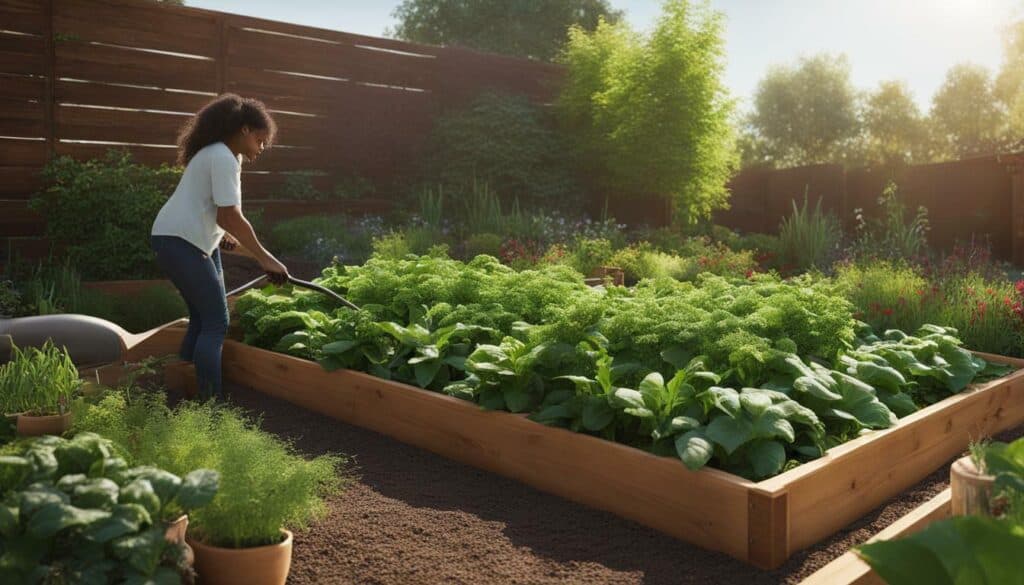
Assessing soil health is crucial in organic gardening. By understanding your soil’s condition and taking steps to improve it, you can create a thriving garden that is beneficial for both plants and the environment.
Building Healthy Soil
Building healthy soil is essential for successful organic gardening, and there are several methods to achieve it. Organic gardening focuses on nurturing and harnessing healthy soil to create gardens with fewer pest and disease problems. By avoiding synthetic fertilizers and pesticides, organic gardening not only benefits our health but also the environment. Here are some tips to help you build healthy soil for your organic garden.
Assess Your Soil Health
Before planting anything, it’s crucial to assess the health of your soil. Start by checking if you have enough penetrable soil and determine its type (clay, loam, sandy soil). You can purchase do-it-yourself soil test kits or send a sample to your local agricultural extension office for a more comprehensive analysis. This will help you determine the pH level, nutrient deficiencies or excesses, and other factors that can affect plant growth.
Improve Soil Quality
Improving the quality of your soil is a crucial step in organic gardening. One effective method is to add organic matter to your soil, such as compost, manure, or shredded leaves, which enriches the soil with nutrients and beneficial microorganisms. You can also use cover crops like clover or beans to add organic matter and improve soil health. Mulching with organic materials like straw or grass clippings helps retain moisture, suppress weeds, and encourage healthy soil structure.
Another method to improve soil quality is by adding topsoil and peat moss, which can help loosen compacted soil and improve water retention. You can also mix in perlite or vermiculite to improve soil drainage.
Building healthy soil takes time and effort, but it is well worth it in the long run. Healthy soil not only produces healthier plants but also requires less fertilizer and water. By practicing sustainable gardening techniques, you can help conserve natural resources and reduce your carbon footprint.
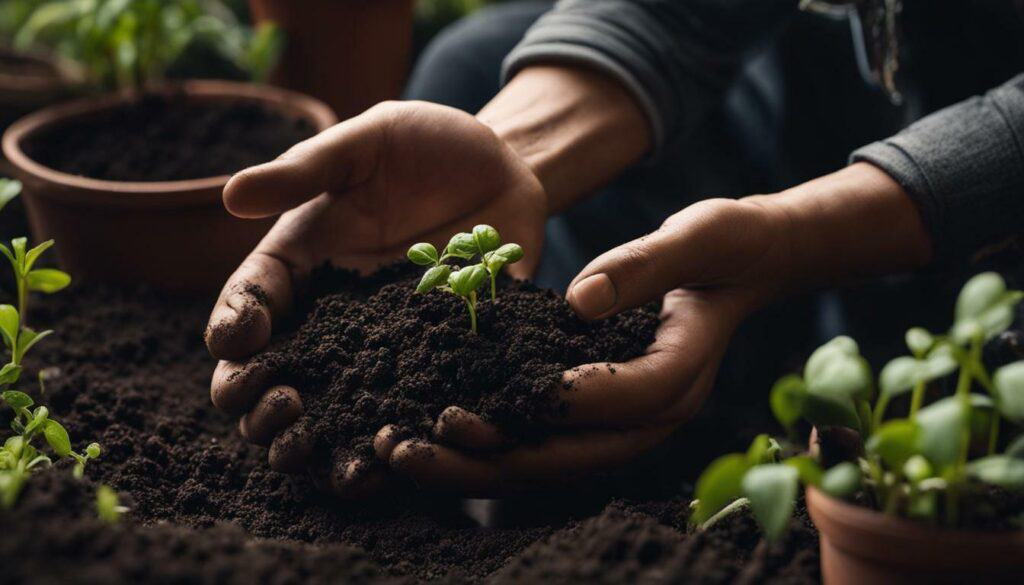
Building healthy soil is just one aspect of successful organic gardening. By mastering the basics and focusing on nurturing healthy soil, you can create a thriving organic garden that provides nutritious food for you and your family.
Nurturing Your Organic Garden
Nurturing your organic garden involves regular watering, mulching, and employing organic pest management practices. With these techniques, you can ensure your plants remain healthy and produce a bountiful harvest.
Watering your organic garden should be done consistently, but not excessively. Plants require about 1 to 2 inches of water a week, depending on the climate and soil type. To avoid overwatering, check the soil moisture level by inserting your finger into the soil. If it feels dry, it’s time to water.
Mulching is also important for maintaining a healthy garden. Mulch can help regulate soil temperature, conserve moisture, and prevent weed growth. Consider using organic materials such as straw, leaves, or grass clippings for mulch.
Managing pests organically is another crucial aspect of nurturing an organic garden. Avoid using synthetic pesticides and instead use natural methods such as companion planting, insect-repelling plants, and handpicking pests. These methods are not harmful to the environment or beneficial insects.
Overall, using organic gardening techniques has numerous benefits such as improving soil health, reducing pesticide exposure, and increasing the nutrient content of fruits and vegetables. By practicing sustainable gardening, we can create a healthier environment for ourselves and future generations.
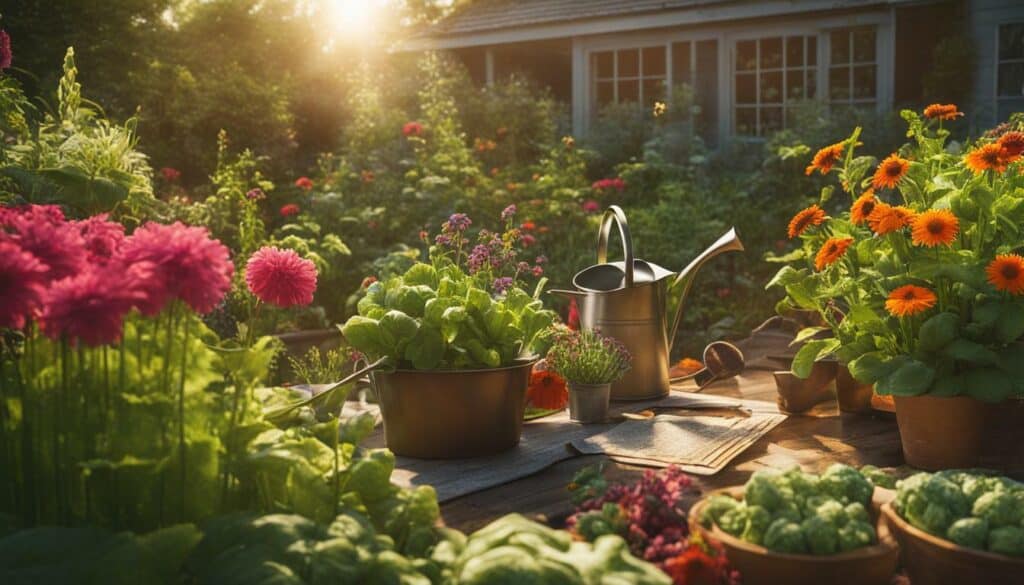
“Gardening is the purest of human pleasures.” – Francis Bacon
If you’re interested in learning more about organic vegetable gardening, check out the course offered by a national gardening expert. Additionally, a book on creating an easy and efficient organic garden is recommended. With the right tools and knowledge, you can create a beautiful and fruitful organic garden.
Harvesting and Enjoying the Fruits of Your Labor
Harvesting the fruits of your labor from an organic garden is not only rewarding but also provides you with nourishing and delicious produce. After all the hard work put into nurturing your garden, it’s time to reap the benefits of your efforts. Here are some tips to help you make the most of your organic garden:
- Harvest at the right time: Different crops have different harvesting seasons, so make sure you know when to harvest each plant. Most crops are best when harvested in the morning, before the sun gets too hot. You can also check if the fruit or vegetable is ripe by gently squeezing it or checking its color.
- Store properly: Proper storage is important to ensure your produce stays fresh for as long as possible. Some fruits and vegetables can be stored in a cool, dry place like a pantry or cellar, while others require refrigeration. Make sure to remove any damaged or spoiled produce to prevent spoilage.
- Preserve excess produce: If you have more produce than you can consume, consider preserving it for later use. Freezing, canning, and pickling are all great ways to preserve excess produce and extend its shelf life.
By following these tips, you can enjoy the full benefits of your organic garden and savor the delicious flavors of your home-grown produce. Not only are organic fruits and vegetables tasty, but they are also packed with nutrients and free of harmful chemicals. Organic gardening practices help to protect the environment and promote sustainable gardening for future generations to come.
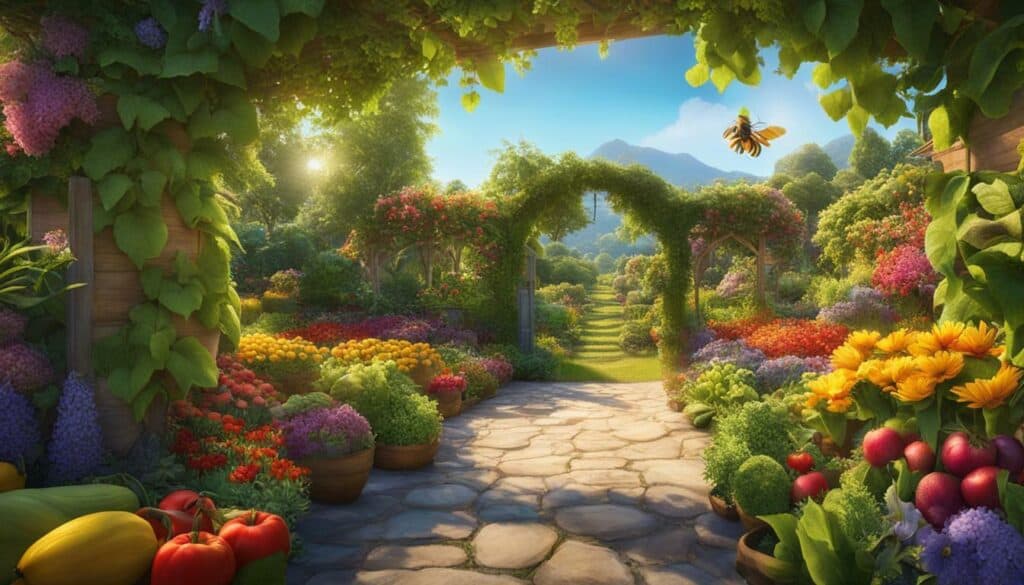
It’s important to always remember that organic gardening is a continuous learning process. As you harvest your produce, reflect on what worked and what didn’t, and use that knowledge for your next gardening season. Sharing your experiences and produce with family, friends, and the community is also a great way to spread the joy and benefits of organic gardening.
Sharing the Organic Gardening Experience
Sharing the joys and benefits of organic gardening with others can strengthen relationships and create a sense of community. Not only does it provide an opportunity to connect with others over a shared interest, but it also allows you to share the abundance of your garden with friends, family, and even those in need.
One way to share the experience is to host a garden tour or open house. This allows others to see your garden and learn about your techniques for organic gardening. It also provides a great opportunity for others to ask questions and gain inspiration for their own gardening endeavors.
Another way to share the experience is through donating excess produce to local food banks or community organizations. This not only helps those in need but also reduces food waste and promotes sustainable gardening practices.
Also, consider joining a local gardening club or community garden. This allows you to meet other like-minded individuals and learn from their experiences while sharing your own.
Sharing your organic gardening experience not only benefits others but also reinforces your own commitment to sustainable gardening practices. Through these simple acts, you can help create a positive impact on your community and the environment.
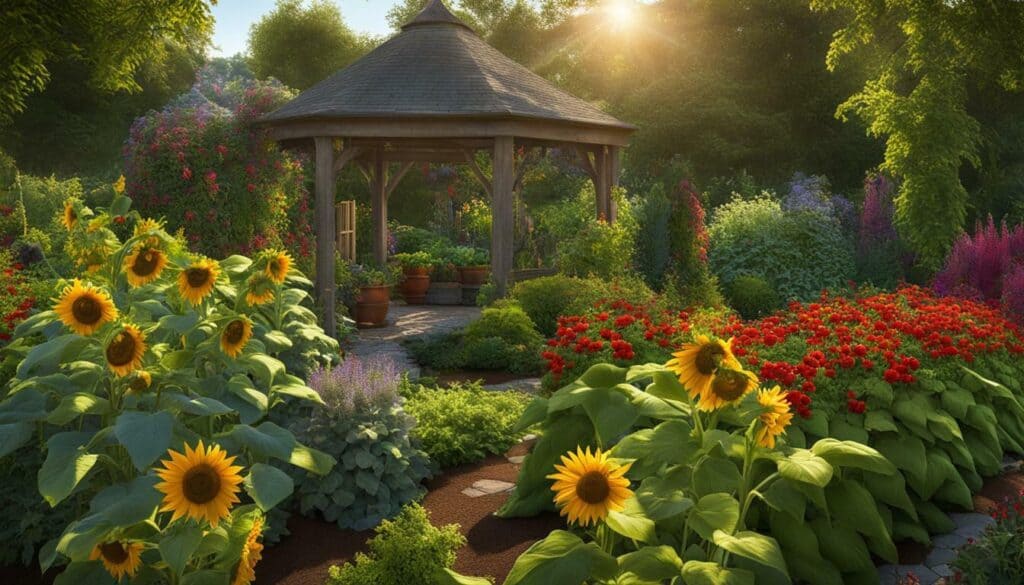
“The love of gardening is a seed once sown that never dies.” – Gertrude Jekyll
What are the key principles of Rodale’s Basic Organic Gardening program?
Rodale’s Basic Organic Gardening program incorporates five key principles to ensure a greener home. First, it emphasizes the use of natural compost and organic fertilizers to promote soil health. Second, it advocates for crop rotation, preventing nutrient depletion and pest buildup. Third, it encourages the use of companion planting to enhance biodiversity and repel pests. Fourth, it promotes water conservation through proper watering techniques and mulching. Lastly, it prioritizes the avoidance of synthetic chemicals, opting for natural pest control methods. By following these principles, basic organic gardening for a greener home becomes achievable.
Conclusion:
Overall, mastering the basics of organic gardening requires understanding your local climate, selecting the right garden site, and nurturing healthy soil. By following these steps and using organic gardening practices, gardeners can enjoy a plethora of benefits. With an organic garden, individuals can connect with nature, enjoy fresh produce, and contribute to a healthier environment. It is crucial to assess soil health, pay attention to ongoing care, and properly harvest and store produce. Additionally, gardeners should seek guidance from experienced local gardeners and share their experiences with others, including family, friends, and the community.
When starting an organic garden, it is essential to select a suitable garden site with appropriate sunlight, soil quality, water availability, and wind conditions. Additionally, understanding your local climate is crucial for determining the best time to plant and ensure the long-term success of your garden. Building healthy soil through adding organic matter and compost is vital for providing necessary nutrients to plants and promoting healthy growth. Nurturing an organic garden requires ongoing care, including watering, mulching, and managing pests organically.
The benefits of organic gardening extend beyond personal well-being to contribute to a healthier environment. By avoiding synthetic fertilizers and pesticides, gardeners help reduce the amount of harmful chemicals in the soil and water systems. Additionally, by supporting sustainable gardening practices, gardeners can reduce their ecological footprint and promote a healthier planet for future generations to enjoy.
Starting and maintaining an organic garden may seem daunting at first, but with the right knowledge and preparation, anyone can enjoy the rewards it brings. Happy gardening!
FAQ
Q: What is organic gardening?
A: Organic gardening involves avoiding synthetic fertilizers and pesticides, nurturing healthy soil, and creating gardens with fewer pest and disease problems.
Q: Why is organic gardening important?
A: Organic gardening is important for both health and the environment. It eliminates the use of harmful chemicals and promotes a healthier ecosystem.
Q: How do I determine my USDA plant hardiness zone?
A: You can determine your USDA plant hardiness zone by using an online zone finder tool or by consulting a local gardening expert.
Q: What is a frost-free date and why is it important?
A: A frost-free date is the average date in your area when the last frost is expected to occur. It is important to know this date to determine the best time to start planting in your garden.
Q: Should I seek guidance from experienced gardeners?
A: Yes, seeking guidance from experienced local gardeners can provide valuable insights and tips specific to your area.
Q: What factors should I consider when selecting a garden site?
A: Factors to consider when selecting a suitable garden site include size, sunlight, soil quality, water availability, and wind conditions.
Q: How do I assess the health of my soil?
A: You can assess the health of your soil by conducting a soil test or by observing the presence of earthworms and other beneficial organisms.
Q: How can I build healthy soil for my organic garden?
A: Building healthy soil for your organic garden involves adding organic matter, compost, and other soil amendments to improve its quality and fertility.
Q: How should I care for my organic garden?
A: Caring for your organic garden involves proper watering, mulching, and managing pests organically to promote healthy plant growth.
Q: What should I do with the produce from my organic garden?
A: You can harvest and enjoy the fruits of your labor from your organic garden. Proper storage and preservation techniques can help you make the most of your harvest.
Q: How can I share the organic gardening experience with others?
A: Sharing the organic gardening experience with others, such as family, friends, and the community, can help spread the benefits and joy of organic gardening.
Source Links
- https://organicgardeningacademy.com/
- https://todayshomeowner.com/lawn-garden/guides/organic-gardening-101/
- https://www.amazon.com/ORGANIC-GARDENING-MASTER-GUIDE-condition/dp/B0B1CG9J3J
- https://extension.psu.edu/growing-an-organic-garden-the-fundamentals
- https://piedmontmastergardeners.org/understanding-organic-gardening/
- https://thehouseandhomestead.com/organic-gardening-beginners/
- https://www.theselfsufficienthomeacre.com/organic-gardening-for-beginners
- https://joegardener.com/tag/organic-gardening/
- https://www.bhg.com/gardening/vegetable/vegetables/tips-for-growing-an-organic-vegetable-garden/
- https://www.extension.iastate.edu/news/yard-and-garden-selecting-site-vegetable-garden
- https://hort.extension.wisc.edu/articles/beginning-vegetable-garden-basics-site-selection-and-soil-preparation/
- https://extension.unh.edu/resource/preparing-vegetable-garden-site
- https://www.nrcs.usda.gov/conservation-basics/natural-resource-concerns/soils/soil-health
- https://www.nrcs.usda.gov/conservation-basics/natural-resource-concerns/soils/soil-health/soil-health-assessment
- https://edis.ifas.ufl.edu/publication/SS657
- https://extension.psu.edu/practical-tips-for-healthy-soil-in-a-home-garden
- https://www.gardeners.com/how-to/building-healthy-soil/5060.html
- https://themicrogardener.com/5-simple-secrets-to-building-healthy-soil/
- https://www.allaboutgardening.com/organic-gardening/
- https://www.almanac.com/organic-gardening-basics-how-start-organic-garden
- https://www.gardencityharvest.org/the-real-dirt-garden-city-harvest-blog/2015/08/05/enjoy-the-fruits-of-your-labor-harvesting-basics
- https://cottageatthecrossroads.com/enjoying-the-fruits-of-our-labor/
- https://www.sandiegouniontribune.com/lifestyle/home-and-garden/story/2020-07-11/garden-mastery-enjoy-the-fruits-and-the-vegetables-of-your-labor
- https://www.thespruce.com/basics-for-gardening-organically-1402445
- https://www.mofga.org/resources/fact-sheets/basics-of-organic-vegetable-gardening/
- https://ecogardener.com/blogs/news/what-you-need-to-know-about-organic-gardening

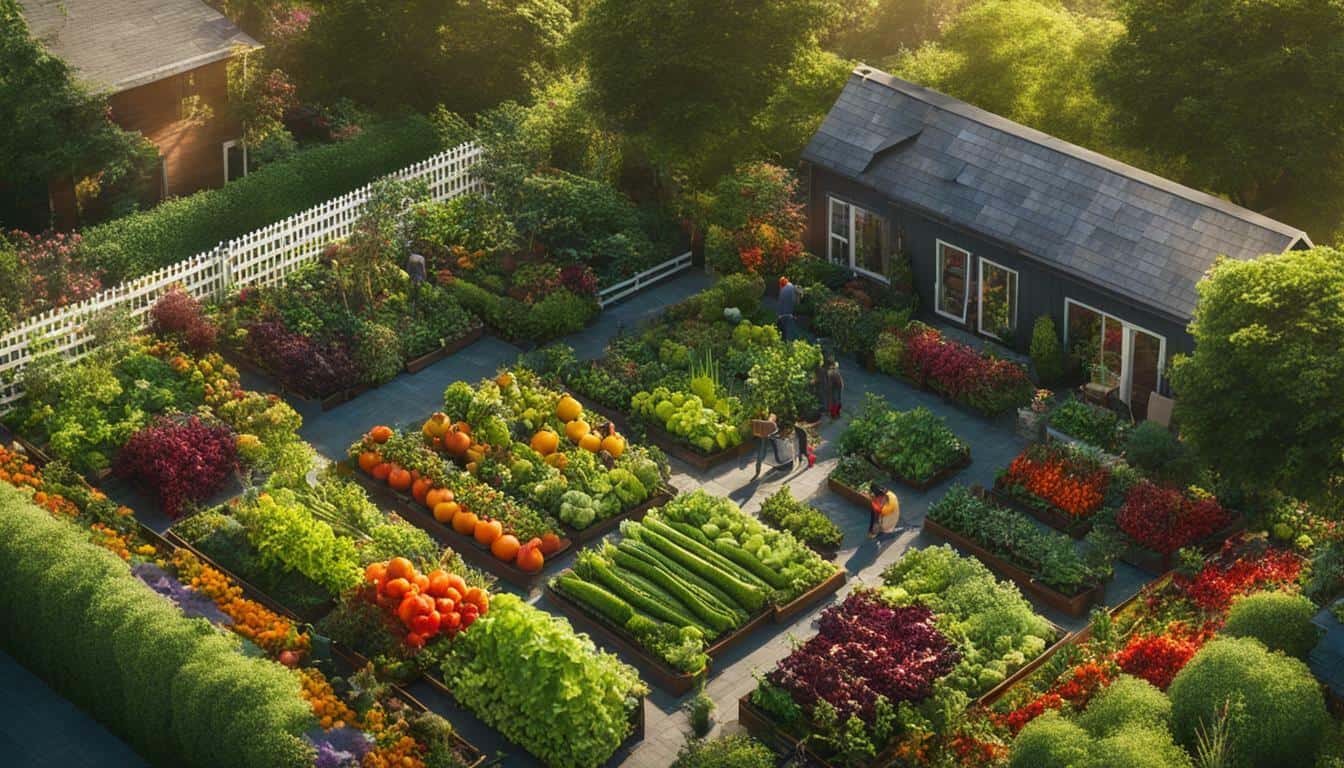
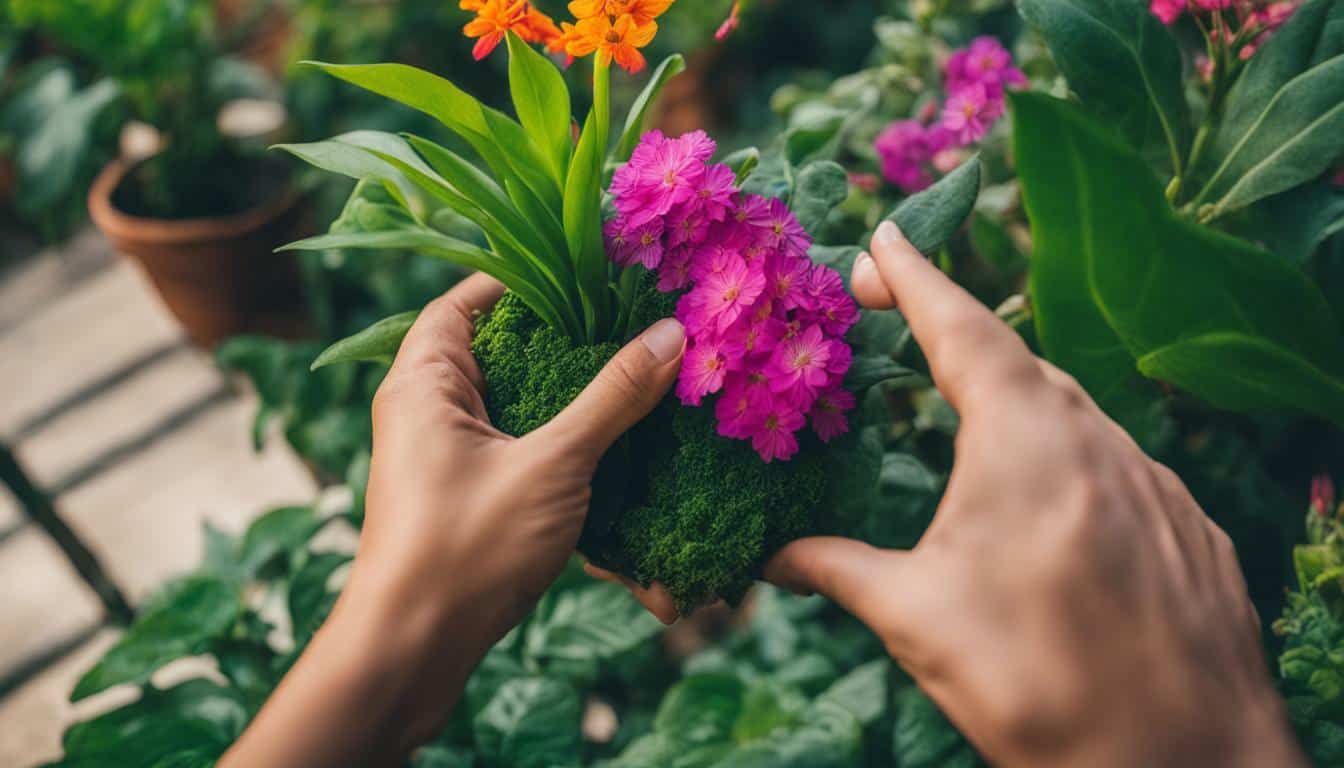
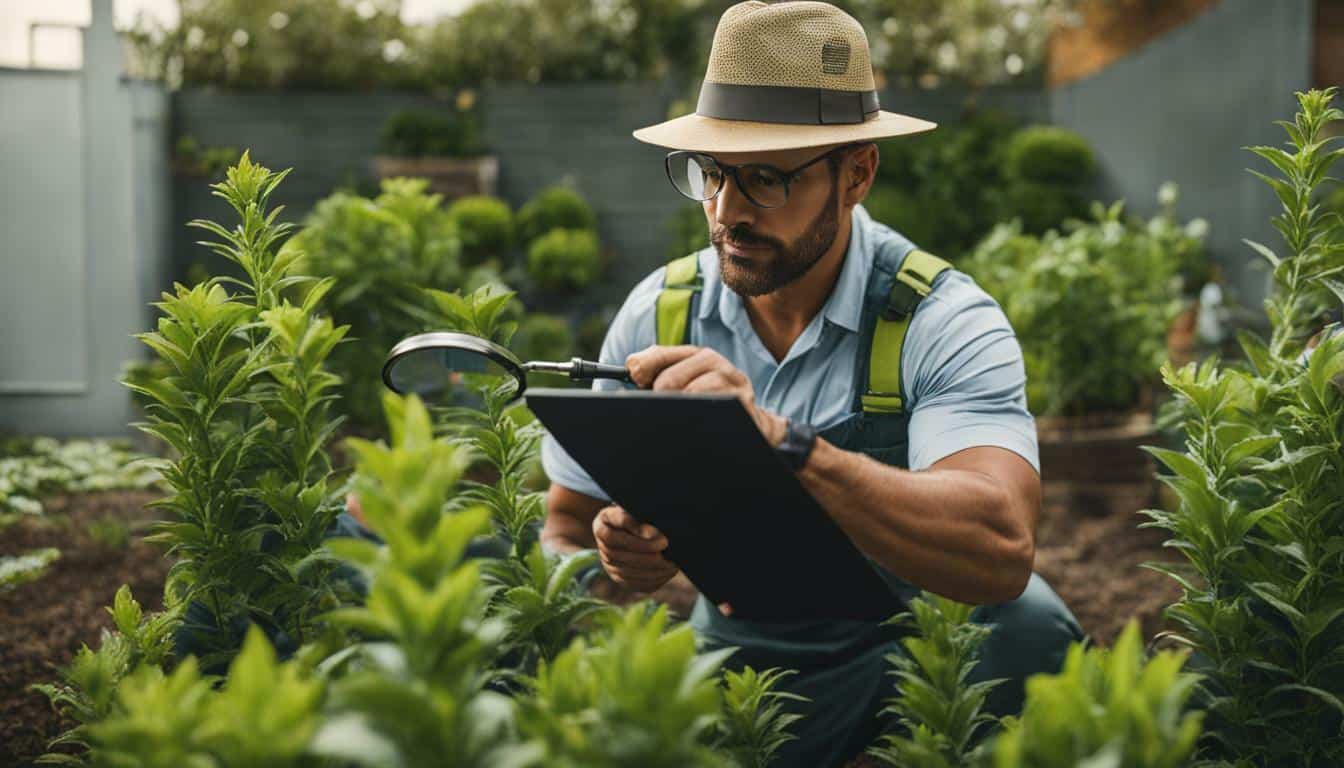

Leave a Reply